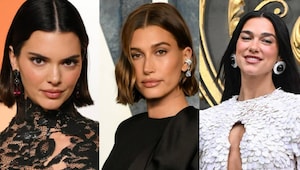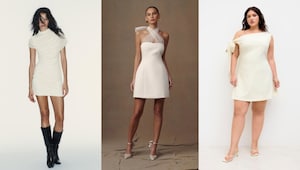10 Women Share Their Inspiring Self-Love Stories
Looking for that sign of motivation? Here it is.

Looking for that sign of motivation? Here it is.

11) Shriya Pilgaonkar,“I have always been very comfortable in my own skin because my ‘sense of self’ never came from how I looked. And that has a lot to do with how I was brought up—our idea of beauty is a reflection of our values. While, as an actor, I like to stay fit and enjoy wearing make-up, it would be dangerous to attach my self-worth to my body, which will keep evolving with time. I live with a strong sense of awareness that my confidence needs to come from who I am as a person and what I am doing in life, rather than beauty or my body.
I was a professional swimmer for 13 years and that would mean training in the pool for five to six hours every day. As a result, I was extremely tanned. My parents are very fair and people would often make comments about my skin tone, as compared to theirs. Initially, it made me a conscious, but then I laughed it off because I was winning gold medals as a swimmer, and didn’t care what my skin looked like. Interestingly, it wasn’t the kids but the adults who would taunt me.
There is this notion that it is a woman’s role to please a man, and it is subconsciously ingrained in many minds. We need to change that. This basic idea governs our day-to-day interactions, and women tend to feel more pressure to look appealing for men. We really can’t give society that power to define what beauty is and for that, we need to have more positive role models. It’s important for women who have the influence to speak about their journeys with their body and share their vulnerabilities. Today, the idea of beauty is shifting, and it is more inclusive than it has ever been. Whether it is stretch marks not being Photoshopped in photos, plus-size models on runways, actors speaking about eating disorders, or people of all colours and races on the covers of magazines, diversity is being celebrated and demanded...and that is a wonderful, positive sign.”

22) Akasa, Singer, Performer, and
TV“As someone who was always ‘chubby’ (a term my Punjabi family uses), I’ve had my fair share of body struggles. I hit puberty way too early and developed curves that a tweenager didn’t know how to handle. I would wear three bras under my school uniform to make my breasts appear flatter, because I didn’t want to attract attention. Indian women are used to being stared at, but adjusting to men staring at my chest at the age of 12 or 13 was extremely uncomfortable. In college, I began to explore my identity as a performer, musician, and actor, and that helped a lot. I became more confident and ‘body acceptance’ just came along with it. And with that came the need to work on my body...on myself. I took up fitness at the age of 19, and thanks to my trainer, I learned to value my body. Now, I am obsessed with it. I do gain and lose a few kilos here and there, but I absolutely love my body.”

33) Amrita Puri,“Growing up, I was insecure about my body. I was a great swimmer, but as I gained weight in my teens, I refused to participate in swimming competitions because I was so conscious. My legs were not shapely, and I didn’t want the boys in school to see me in a costume. In my view, I have fat Punjabi thighs—and I have always refrained from wearing short clothes because of that.
A few years ago, I was on the other end of the spectrum. I lost a lot of weight. I kept getting skinnier and, to be honest, I was kind of happy about it. Until it got to a point where I became too thin. I didn’t realise it was because I was anxious and depressed, and that it was affecting me physically as well as emotionally. This went on for about a year. I must add that with the initial weight loss, many people were impressed and envious. The prevailing notion in my line of work is, ‘skinny is good’. However, once I became too thin (I was 49 kilos instead of my average weight, which is 54 kilos), everyone felt free to comment on my appearance, telling me I needed to put on some weight. Or that my face has lost its charm...not realising that I was going through my own set of emotional issues. Whether someone is over- or underweight, nobody should feel like they have the right to comment on someone’s size. It is damaging and unhealthy.
It has taken a very long time for me to be comfortable with my body. I seek comfort in food, binge-eat, and then feel awful about myself the next day. I realised that I am an emotional eater. And that is something I have had to work on through positive self-talk and action. What has changed over the years, though, is that now I focus more on fitness than weight. I enjoy exercising—I was a lazy kid, and did not like any physical activity. So this is a big win for me. I don’t deny myself anything, but try to maintain balance, and ensure what I consume makes me feel good. I am still conscious about my legs not being toned. But I love my face...and now, my body, too. I feel it is important that I am vocal about what I love about myself. I have learned to redefine what sexy is...I know I am not meant to be perfect or live up to anyone’s standards but my own!”

44) Aishwarya Gupta, Model“I am very proud of my body, and I feel it is unique in its own way. I’m thin, have scars and stretch marks, and braces, yet I love to smile like I’m not wearing them. But I wasn’t this confident growing up. Because I was super-tall and lanky, the boys would call me names...even the teachers did! I used to wear braces back then too, but I was extremely conscious about having them on. So I decided to get rid of them before my teeth were fully fixed. I remember thinking, ‘God, why am I not normal?!’. The two things I am most proud of now—my height and my smile—were a huge cause of insecurity to me back then.
When I joined NIFT, several people asked me to consider modelling, which is when I started to feel more confident and became self-accepting. And now, I flaunt my braces as if they were jewellery, and I’m proud of my body! It’s these attributes that I once saw as my flaws, which are now my best and distinguishing characteristics. Most importantly, I’m a girl from a small city in India who has made it this far with all of these so-called flaws, and I hope I go on to break many more such stereotypes.”

55) Raveena Tandon, Actor“I have had a love-hate relationship with my body since as long as I can remember. As a young girl, I hated myself. I was that fat girl in class who everyone teased. Even when I started my career at the age of 16 (which was way too young!), I was definitely ‘plump’. But I was never insecure about my body.
I got serious about losing weight when I signed my first film, Patthar Ke Phool. But the worst was how the media body-shamed me on a regular basis...shockingly, female journalists said the worst things about me. Today, everyone is politically correct, but back then, I was called ‘Miss Thunder Thighs’ and address as ‘Amazonian’. And that made me extremely conscious about my body. I am a tall woman with a big build, and while I wasn’t as slim as the other girls, I did try my best to get fit and wear clothes that would suit my body type. I have seen that some of the same journalists claim to be feminists now, but if only they dug up their own past, they would see how they have shamed women through the years. The media plays a crucial role when it comes to body acceptance,
and they should realise that such references can have a huge impact on people’s
mental health!
I don’t think I ever got around to accepting my body completely. It has been a constant struggle...you know, the Battle of the Bulge! But now that I’m in my 40s, I’m very comfortable with the way I am. I even dress more confidently than I did when I was in my 20s or 30s. Being a woman of substance and being confident is more important to me now than fitting someone’s idea of a ‘perfect body’.”

66) Karishma Leckraz, Content“I’m very petite, standing at 4 feet 8 inches, and my relationship with my body is complicated, to say the least. I am still in the process of learning to love it. Due to being ‘smaller’ in every sense of the word, dealing with a chronic skin condition (atopic eczema) and being dark complexioned, I have had to face various detrimental comments over the years—from my family, friends, and strangers—that most would class as ‘backhanded compliments’. For example, I get told: ‘I wish I were as skinny as you, it’s not fair!’. And then there are some who will say, ‘You should eat more, you’re too skinny’. All these unattainable standards made me question myself constantly. Listening to the way society wants me to change is exhausting, and has affected my self-esteem. I have accepted that I will never be taller...having a solid support system helped me overcome my ‘height complex’. But in terms of accepting my body, it’s still a fight. Repeating positive affirmations to myself has helped in the journey of attempting to change my mindset. Another thing that has helped me a great deal is coming to the conclusion that a lot of body-led opinions are based on social constructs, which change every hour. What is desirable one minute isn’t the next. I take comfort in recognising that it is impossible to keep up with these standards of beauty, and that keeps me focused on my journey to self-love.”

77) Agsy, Rapper and“My love-hate relationship with my body keeps me on my toes. There are days when I feel empowered and in love with every bit of my body, and then there are days when I stress about someone else’s ‘perfect’ body and start finding flaws in mine. I think you would hardly find any woman who hasn’t felt insecure about her looks...especially growing up (thank you, society!). Young girls are so impressionable, and because of the beauty ‘norms’ they are fed, they feel like they need to ‘fit in’ to be accepted. It’s a vicious cycle, and it has been going on for so long that we are hardwired to believe it, making body-shaming a normal occurence. What I am most insecure about is my arms...and to this day, I don’t wear anything without sleeves because I don’t think I’d look good in it. But I have come to terms with my body-type, and have learned to love myself no matter what the shape. (Also, dressing according to one’s body-type really helps you focus on your ‘best bits’.) I have also realised that your insecurities shouldn’t stop you from being confident about yourself...it’s what makes you unique.”

88) Hamel Patel, Content
“Most days, I try to look at my body as a powerhouse. One that works hard so I can live my best life. But some days, I let my insecurities get the better of me, and those are the days where I need to show myself a little extra love. I guess I feel this way because growing up, people commented on everything about me, from how petite I was to my hair, skin, and even my nose! With those comments came insecurities, and it took me years to get over them. Being vulnerable and sharing my insecurities with my community on Instagram has helped me overcome them to an extent. While sharing my experiences helped my Followers embrace themselves, it also showed me that I wasn’t alone in how I felt. Learning how to love myself, and undoing what society has instilled in our brains, was a process, and it didn’t happen overnight. I was constantly telling myself that I didn’t have to look or act a certain way to be considered ‘beautiful’, because all of us were made unique and that’s what ‘beauty’ truly is. Women are always told what to do with their bodies since they’re born—we are told to act a certain way, look a certain way, dress a certain way... But social media has exposed us to a powerful community of body-positive role models like Deepica Mutyala, Nabela Noor, Serena Williams, Johnathan Van Ness...and I admire all of them so much!”

99) Saiee M Manjrekar,“Growing up, I was ‘bigger’ than most girls, and that gave the kids in school a chance to bully me. All the comments that were made about how I looked stayed with me, and this marked the beginning of a rocky relationship with my body. In many ways, it also motivated me to work out. The fact that I was working in a film was also a huge reason to stay fit. But whenever I wanted to quit working out—sometimes you do, you know?!—I couldn’t help but look back at the time I was bullied for my ‘size’. Weight is something you can lose, but you can’t really change your features. For example, I never liked my nose. So whenever I look at myself in the mirror, my eyes go straight to my nose, because that’s the part I’m most insecure about. I have learned to overcome this insecurity by just accepting that it’s a part of my face...and honestly, I wouldn’t want my face to be any different. Society and the media play a very important role in how women view their bodies. But it’s not just women, men have body-image issues, too. Everyone has their own insecurities, but a woman is looked down upon if she doesn’t conform to a certain ‘body-type’ or ‘beauty standard’, more than a man is. The one wonderful thing about the body-positivity movement is that it’s normalising all kinds of shapes and bodies. I found my role model in Jameela Jamil, because she’s so real and open about her issues. She makes it a point to encourage people to love themselves, no matter what.”

1010) Deveney Dweltz,“My freckles bothered me a lot as a kid. People thought it was a skin disease, and constantly gave me suggestions on how to get rid of them. And the advertisements about skin-lightening and dark-spots removal creams didn’t help, either... Growing up in India with ‘different’ features made ‘blending in’ a constant effort. It was a difficult period for me until Anima Creative Management scouted my twin sister Gayle and myself in 2016. They appreciated our ‘unusual’ features and that changed our lives in many ways. We started to see ourselves differently, and stopped getting bothered by what people thought of us. I have reached a point where I feel like I am enough. I like the way I look in the mirror...how my body looks...and that brings a smile to my face.”
Agency: Anima Creative Management
Comment
more from Celebrity

Fresh, fun accessories shaping the new-age 'It-girl' aesthetic

Lit Christmas gifts that deserve a spot on every book lover’s shelf

Statement earrings you need to complete your perfect holiday fit

Silver going out tops that are your VIP pass to the dance floor

The little white dresses that are about to become your holiday-season power staples

Tweed bags are the official holiday accessory to own—and these are the ones to get stat
